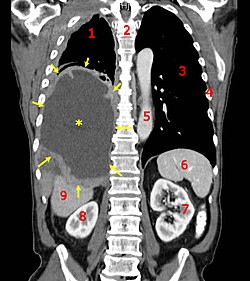
Back Onkologie Afrikaans Oncolochía AN علم الأورام Arabic اونكولوچى ARZ Oncoloxía AST Onkologiya Azerbaijani اونکولوژی AZB Анкалогія Byelorussian Анкалёгія BE-X-OLD Онкология Bulgarian
This article needs additional citations for verification. (July 2022) |
 A coronal CT scan showing a malignant mesothelioma, indicated by the asterisk and the arrows | |
| Focus | Cancerous tumor |
|---|---|
| Subdivisions | Medical oncology, radiation oncology, surgical oncology |
| Significant tests | Tumor markers, TNM staging, CT scans, MRI |
| Occupation | |
|---|---|
Occupation type | Specialty |
Activity sectors | Medicine |
| Description | |
Fields of employment | Hospitals, clinics, clinical research centers |
Oncology is a branch of medicine that deals with the study, treatment, diagnosis, and prevention of cancer.[1][2] A medical professional who practices oncology is an oncologist. The name's etymological origin is the Greek word ὄγκος (ónkos), meaning "tumor", "volume" or "mass".
Oncology is focused on the diagnosis of cancer in a person, therapy (e.g., surgery, chemotherapy, radiotherapy and other modalities), monitoring of patients after treatment, palliative care of people with advanced-stage cancers, ethical questions surrounding cancer care, screening of patients, and the study of cancer treatments through clinical research.[1][3]
An oncologist typically focuses on a specialty area in cancer treatment, such as surgery, radiation, gynecologic oncology, geriatric oncology, pediatric oncology, and various organ-specific disciplines (breast, brain, liver, among others).[1][2]
The expertise of an oncologist is applied when cancer is suspected, is diagnosed with cancer, or undergoes cancer treatment.[1]
- ^ a b c d "What is oncology?". American Cancer Society. 2025. Retrieved 28 March 2025.
- ^ a b "Medical oncology - Overview". Mayo Clinic. 24 December 2024. Retrieved 28 March 2025.
- ^ Singh, Sajal Raj; Bhaskar, Rakesh; Ghosh, Shampa; Yarlagadda, Bhuvaneshwar; Singh, Krishna Kumar; Verma, Prashant; Sengupta, Sonali; Mladenov, Mitko; Hadzi-Petrushev, Nikola; Stojchevski, Radoslav; Sinha, Jitendra Kumar; Avtanski, Dimiter (2025-03-24). "Exploring the Genetic Orchestra of Cancer: The Interplay Between Oncogenes and Tumor-Suppressor Genes". Cancers. 17 (7): 1082. doi:10.3390/cancers17071082. ISSN 2072-6694. PMC 11988167. PMID 40227591.
© MMXXIII Rich X Search. We shall prevail. All rights reserved. Rich X Search